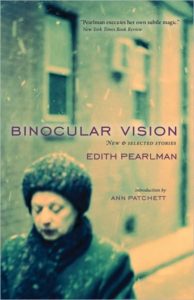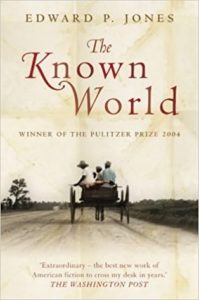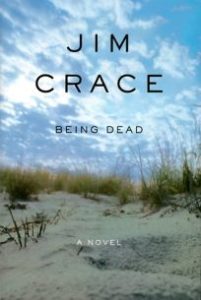
Tonight, from a ceremony at the New School in New York City, the winners of the National Book Critics Circle Awards will be announced.
One of the American literary world’s most prestigious set of awards, the NBCCs honor the finest books and reviews published in English during the previous calendar year (across six categories: Fiction, Nonfiction, Poetry, Autobiography, Biography, and Criticism).
We’ll bring you news (and reviews) of all the winners bright and early tomorrow morning, but for now, why not take a look back over the previous eighteen recipients of the National Book Critics Circle Award for Fiction.
*
2017
Joan Silber, Improvement
“Life unfolds for Silber’s characters as a series of accidents, happy and otherwise, and any good fortune they do find is most likely provisional … You can feel…how tenderly Silber treats her large cast of men and women, how she deals out small moments of grace even as things go terribly wrong for them. This seems like a good place to bring up Silber’s voice: unshowy and intimate, precise and colloquial, she seems almost to be confiding the novel to us, a worldly wise aunt not unlike Kiki herself. She marshals great feeling in the course of Improvement without making it seem a big deal … The decorative carpet that graces the jacket of Improvement will play a crucial role in the novel’s denouement. It can also serve as a metaphor for the work of art that Silber has created, woven from many strands whose pattern becomes evident only when it is completed. And like that carpet, it is at once intricate and gloriously simple. Improvement is an everyday masterpiece.
–Tom Beer (Newsday)
2016
Louise Erdrich, LaRose
“You’re going to want to take your time with this book, so lavish in its generational scope, its fierce torrent of wrongs and its luxurious heart. Anyway, you may have no choice, as you fall under the spell of a master investigating invisible boundaries and perpetual bisectings…Erdrich writes the enspirited and the visible, traveling that bisecting line that separates the present from the past. Revenge can live alongside honor, grace with trauma. She mingles the enduring pain with humor, ceremony, ritual, legacy, reparations both real and false, and so much love, blending ceaselessly until no separate parts remain but one beautiful novel.
–Susanna Sonnenberg (The San Francisco Chronicle)
2015
Paul Beatty, The Sellout
“The Sellout makes room for both satirical spectacle and earnest literary whispers. Beatty’s reliance on so many textured backstories and secondary characterizations feels both revelatory and absolutely intentional … The Sellout while riding beneath terrifying waves of American racial terror and heteropatriarchy, is among the most important and difficult American novels written in the 21st century … The Sellout, in all its spiky satirical absurdity, exists not just in a world created by hip-hop and cradled by the Internet. The Sellout firmly situates itself between white supremacy and black love, between thick anti-blackness and communal black innovation. It is a bruising novel that readers will likely never forget, especially those readers with the stomach to imagine and the will to remember the mystery and enduring thump of ‘our thing.'”
–Kiese Laymon (The Los Angles Times)
2014
Marilynne Robinson, Lila
“Robinson resists the notion of love as an easy antidote to a lifetime of suffering or solitude, suggesting that intimacy can’t intrude on loneliness without some measure of pain … Lila takes as its core concern what might have constituted, in another narrative, a happy ending: two lonely souls who never expected happiness somehow finding it. But Robinson’s quest is to illuminate how fraught this happiness is, shadowed by fears of its dissolution and the perverse urge to hasten that dissolution before it arrives unbidden … Robinson’s choice to keep returning to the world she first introduced in Gilead is itself a way of paying tribute to complexity. Beneath the surface of each character, the trio of novels reminds us, is a particular and infinite soul.”
–Leslie Jamison (The Atlantic)
2013
Chimananda Negozi Adichie, Americanah
“More than race, Americanah is about all the ways people form their identities: what we put on and what we take off, the things we accumulate and those we discard along the way … Those who stand outside are in a good position to look in, and it is Adichie’s remarkable powers of observation that drive this novel. Every detail feels relevant, because they all work as markers of what the novel calls ‘costume’: the mannerisms and affectations that we use to create an image of ourselves in the eyes of others, and even ourselves … It is rare to come upon a novel that genuinely alters one’s view of the world. For me, Americanah was one of those books.”
–Ruth Franklin (Bookforum)
2012
Ben Fountain, Billy Lynn’s Long Halftime Walk
“Like the flag raisers of Iwo Jima, the men of Bravo have been whisked back to the United States for a two-week victory tour, climaxing, on the day of the novel, with an appearance at the Dallas Cowboys’ stadium … Within 50 pages things are coming nicely into focus, from ‘the woody grain of the turkey’ served up as part of a gigantic buffet, to the shifting choreography of the squad’s dealings with their adoring public … Fountain keeps the reader’s plate piled high. It all happens in tandem; by the time Billy falls for his cheerleader we are in love with the book, and that love finds expression in more and wilder laughter … The book seems like nothing else so much as a single wonderful scene—with a brief intermission at Billy’s home—from which all traces of initial uncertainty have been removed.”
–Geoff Dyer (The New York Times Book Review)
2011

Edith Pearlman, Binocular Vision
“Pearlman peels back the surface of the conventional and reveals the more complicated emotions underneath … What Pearlman is evoking is the difficulty of intimate interaction, the inevitable distance between even the closest human beings. Again and again here, in extreme circumstances or otherwise, people try, without ever fully succeeding, to connect … Although 18 of these stories come from Pearlman’s three previous collections, all of the pieces here have been exquisitely arranged to make this book. Themes recur; narratives speak to one another—the effect is not so much of a sampling as of a suite. Of all the remarkable things about Binocular Vision, this may be the most compelling, that it enacts a worldview in 34 precise and subtle movements, reminding us that if connection is elusive, there is nobility in perseverance, and that we are almost always greater than the sum of our parts.”
–David L. Ulin (The Los Angeles Times)
2010
Jennifer Egan, A Visit From the Goon Squad
“If Jennifer Egan is our reward for living through the self-conscious gimmicks and ironic claptrap of postmodernism, then it was all worthwhile. Her new novel, is a medley of voices—in first, second and third person—scrambled through time and across the globe with a 70-page PowerPoint presentation reproduced toward the end. I know that sounds like the headache-inducing, aren’t-I-brilliant tedium that sends readers running to nonfiction, but Egan uses all these stylistic and formal shenanigans to produce a deeply humane story about growing up and growing old in a culture corroded by technology and marketing. And what’s best, every movement of this symphony of boomer life plays out through the modern music scene, a white-knuckle trajectory of cool, from punk to junk to whatever might lie beyond. My only complaint is that A Visit From the Goon Squad doesn’t come with a CD.”
–Ron Charles (The Washington Post)
2009
Hilary Mantel, Wolf Hall
“Hilary Mantel’s Wolf Hall is a startling achievement, a brilliant historical novel focused on the rise to power of a figure exceedingly unlikely, on the face of things, to arouse any sympathy at all … Cromwell’s actual life story is, in its way, a somberly fascinating one. But it is not the story that Hilary Mantel has chosen to relate. The Cromwell of Wolf Hall has some of the qualities that his enemies feared and detested—toughness, wiliness, worldliness—but as Mantel depicts them, they are qualities in the service of survival, success, and even a measure of decency in a cruel and indecent world … This is a novel too in which nothing is wasted, and nothing completely disappears.”
–Stephen Greenblatt (The New York Review of Books)
2008
Roberto Bolaño, 2666
“…2666, superbly translated by Natasha Wimmer, is a magnum opus about, well, almost everything …the love-child of David Lynch and Jorge Luis Borges—he’s that visceral and erudite…912 pages of vivid characters, startling dream sequences and stories within stories within stories, all told in the seductive voice of one who experiences the world more intimately than we do and can capture all its nocturnal melancholy and unexpected sunbursts of beauty … 2666 is obsessed with writers and writing… He never lets us forget that, beneath writers’ vaulting words, the world still exists in all its pain, struggle, inequality and violence … Bolaño gives us an unforgettable portrait of an earthly hell, a dusty, sun-flayed sprawl of shacks and little factories just teeming with lost souls—gangsters, corrupt cops, media mystics, heartless bureaucrats.”
–John Powers (NPR)
2007
Junto Diaz, The Brief Wondrous Life of Oscar Wao
“Díaz sings straight to the heart of urban Spanglish, and he’s not waiting for outsiders to catch up. His Spanish is untranslated, as is his freestyle hip-hop slang. Clearly, he’s writing for his people—Dominicans on the island and around New York City—and as far as he’s concerned, everyone else is just listening in … One of the most perceptive things about Díaz’s novel is the way it shows how machismo can crush both the men who don’t conform and those who do … Díaz combines heartbreaking realism with the wildest sort of comic-book fantasy, moving beyond the surrealism of Borges and Cortázar and the magical realism of Márquez and Allende to break new ground. Call it comix realism— it gives Díaz a tremendous verbal and emotional range.”
–Marcela Valdes (Bookforum)
2006
Kiran Desai, The Inheritance of Loss
This is a terrific novel! Read it! Why? First of all, there’s the novel’s generosity. Kiran Desai’s The Inheritance of Loss spans continents, generations, cultures, religions, and races … As events unfold, the novel alternates between Kalimpong and New York. At the same time, it shuttles back and forth between Sai’s youth and that of her Anglophile grandfather, Jemu. Through Jemu, a Third World Horatio Alger, we experience the post-colonial era in all the cruelty of its old, ingrained hatreds and prejudices. Through Sai we experience the precarious present … The Inheritance of Loss offers all of the pleasures of traditional narrative in a form and a voice that are utterly fresh.”
–Ann Harleman (The Boston Globe)
2005

E.L. Doctorow, The March
“Reading historical fiction, we often itch, our curiosity piqued, to consult a book of straight history, to get to the facts without the fiction. But The March stimulates little such itch; it offers an illumination, fitful and flickering, of a historic upheaval that only fiction could provide. Doctorow here appears not so much a reconstructor of history as a visionary who seeks in time past occasions for poetry … The March carries us through a multitude of moments of wonder and pity, terror and comedy, to the triumph of Southern surrender and the sudden tragedy of Lincoln’s assassination. Sherman’s march is large enough, American myth enough, to pull even a laggard recruit along, and to hold Doctorow’s busy imagination fast to the reality of history even as he refreshes our memory of it.”
–John Updike (The New Yorker)
2004
Marilynne Robinson, Gilead
“Robinson’s novel teaches us how to read it, suggests how we might slow down to walk at its own processional pace, and how we might learn to coddle its many fine details. Nowadays, when so many writers are acclaimed as great stylists, it’s hard to make anyone notice when you praise a writer’s prose. There is, however, something remarkable about the writing in Gilead … When Robinson reduces her language, it’s because secular meaning has exhausted itself and is being renovated by religious meaning … Robinson’s book ends in characteristic fashion, with its feet planted firmly on the Iowa soil and its eyes fixed imploringly on heaven, as a dying man daily pictures Paradise but also learns how to prolong every day—to extend time, even on earth, into a serene imitation of eternity.”
–James Wood (The New York Times Book Review)
2003

Edward P. Jones, The Known World
“One great achievement of Edward Jones’s Pulitzer prize-winning novel The Known World is the circumscription of its moral vision, which locates the struggle between good and evil not in the vicissitudes of the diabolical slaveholding system of the American south, but inside the consciousness of each person, black or white, slave or free, who attempts to flourish within that soul-deadening system …a 19th-century concoction, rich in character and plot, comprised of chapters with ironic titles…narrated by an omniscient voice that can penetrate into the souls of the characters even as they leave their bodies behind … a voice that understands the madness of slavery as part of a grander picture, one that begins with bright angels clanging closed the gates on our progenitors, and Satan.”
–Valerie Martin (The Guardian)
2002
Ian McEwan, Atonement
“Ian McEwan’s remarkable new novel Atonement is a love story, a war story and a story about the destructive powers of the imagination…It is, in short, a tour de force … The novel, supposedly a narrative constructed by one of the characters, stands as a sophisticated rumination on the hazards of fantasy and the chasm between reality and art … There is nothing self-conscious or mannered about Mr. McEwan’s writing. Indeed Atonement emerges as the author’s most deeply felt novel yet—a novel that takes the glittering narrative pyrotechnics perfected in his last book, Amsterdam, and employs them in the service of a larger, tragic vision.”
–Michiko Kakutani (The New York Times)
2001
W. G. Sebald, Austerlitz
“Austerlitz’s story is told through his conversations with the novel’s unnamed narrator. The two men meet from time to time over the course of years, sometimes by appointment and sometimes by coincidence. Their conversations wander, as conversations do, and so do the ruminations of the narrator … It isn’t difficult to guess what happened to Austerlitz’s parents; even his own mind tries to protect him from the truth by conceiving an unexamined aversion to the German language and 20th-century European history. And yet, Sebald implies, inside each of us lies an impulse toward understanding, toward remembrance and toward feeling that fights to escape into the open air and will give us no peace if we deny it … The seemingly miscellaneous digressions in Austerlitz are pieces of a puzzle that, when assembled, form a man’s soul and make him whole again for the first time in decades.”
–Laura Miller (Salon)
2000

Jim Crace, Being Dead
“We start their journey, in other words, where they disembark—which suggests an implacable resistance to sentimentality even as it grants an unexpected sort of mercy. Joseph and Celice are dead, murdered. Everything we’ll learn eventually leads to this, but in backward-running time … The time spent with the corpses, as we might expect, is memorable. The scene of their death —they’re both brained with a chunk of granite—is handled with a dispassionate, impressionistic brio … Few novels are as unsparing as this one in presenting the ephemerality of love given the implacability of death, and few are as moving in depicting the undiminished achievement love nevertheless represents.”
–Jim Shepard (The New York Times Book Review)
***
Every Pulitzer Prize for Fiction Winner of the 21st Century

